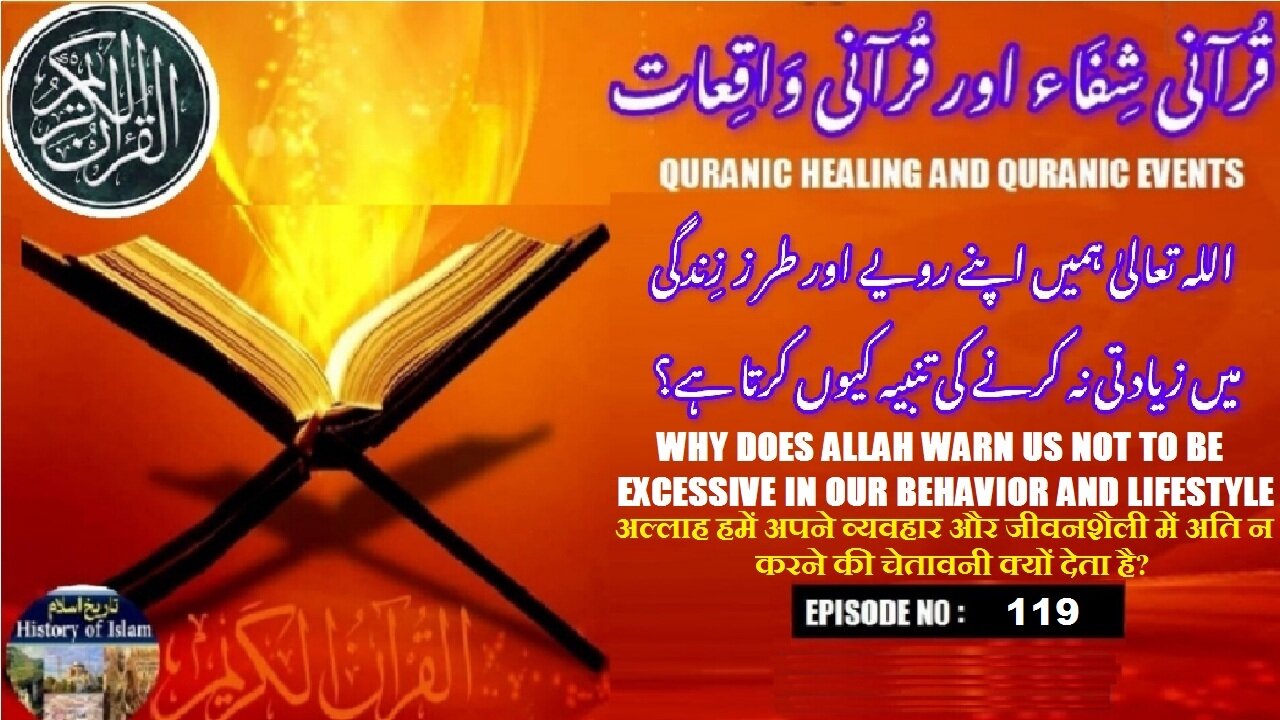Premium Only Content

Why does Allah warn us not to be excessive in our behavior and lifestyle طرز زندگی اور طرز عمل
@islamichistory813 #warn #excessive #behavior #lifestyle#healing #and #events #from #the #quran #historical #stories #and #events #quranicstories #selfhealing #success #stories #striking #events #in #history #quranstories, #storiesfromthequran #religious #creation #stories #trending #quran #short #historical #loves #historical #heroes #what #is #true #strength #calm #quran #recitation #for #babies #islamic #healing
Why does Allah warn us not to be excessive in our behavior and lifestyle?
Brothers, sisters, friends and elders Assalamu Alaikum, wa Rahmatullahi wa Barakatuhu, we are presenting the 119th episode of the Islamic informative video based on healing and events from the Holy Quran,and in this video we will describe, Why does Allah warn us not to be excessive in our behavior and lifestyle?
Islam is a religion of **balance, moderation, and harmony**. One of the key teachings found throughout the Qur’an and Sunnah is the condemnation of extravagance and excessiveness, whether in spending, eating, dressing, worship, or speech. Allah, in His Divine Wisdom, knows that going beyond the limits set by Him leads to corruption, injustice, pride, and moral decay. In Surah Al-A‘raf verse 31, Allah clearly states:
"O Children of Adam! Take your adornment at every masjid and eat and drink, but do not be excessive. Indeed, He does not like those who commit excess."
This verse is not merely about food; it sets a foundational principle of moderation. The phrase “but do not be excessive” is a divine warning against wastefulness, overindulgence, and living beyond one’s means**. The Arabic term israf means to cross the boundaries, whether materially, spiritually, or morally. Allah concludes this verse with a powerful statement: “Indeed, He does not like the excessive.” This tells us that extravagance leads to Allah’s displeasure, and anything that brings about divine displeasure must be avoided for our own good.
In another verse Surah Al-Isra, 27, Allah further says:
“And do not waste [resources], for indeed, the wasteful are brothers of the devils. And ever has Satan been to his Lord ungrateful.”
This verse establishes a severe warning by associating wastefulness with Satanic behavior. Those who live in extravagance are likened to the "brothers of Shaytan", indicating that such behavior originates from ingratitude and rebellion against divine guidance.
The Prophet Muhammad (PBUH), who is the best example for humanity, lived a life of simplicity, despite having access to great wealth and power. His lifestyle was modest, and he constantly warned against indulgence. In a hadith recorded in
Sunan Ibn Majah Hadees 3605 graded Hasan, the Prophet (PBUH), said:
"Eat, drink, give charity, and wear clothes without extravagance or arrogance."
This Hadith shows that Islam does not prohibit enjoying the blessings of life. Eating, drinking, dressing well, and spending are all permissible and even encouraged—as long as they are free from excess and pride. The Prophet (PBUH) urged believers to enjoy Allah’s blessings with humility and balance.
Furthermore, the Prophet (PBUH) warned about the dangers of excess in religion as well. He said: Sunan al-Nasa’i, Hadith 3057; graded Sahih
"Beware of exaggeration in religion, for those before you were destroyed because of exaggeration in religion."
This hadith shows that even religious excessiveness, such as overburdening oneself with acts of worship beyond one’s capacity, can lead to burnout, imbalance, and ultimately abandonment of obligations.
The underlying wisdom in these warnings is that **human beings, when left unchecked, tend to pursue desires excessively**—whether in the form of consumption, luxury, wealth, status, or even religious fervor. This disrupts personal well-being and societal harmony and distances one from spiritual purity.
In the Qur’an Surah Al-Furqan, verse 67, Allah praises the balanced approach:
“And those who, when they spend, are neither extravagant nor stingy, but hold a medium way between those [extremes].”
This is the path of moderation (wasatiyyah) that Islam promotes—a path that brings peace to the individual and society. A lifestyle based on balance avoids the traps of greed, arrogance, pride, and selfishness, which are common results of excess.
In conclusion, Allah warns us against excess in behavior and lifestyle to preserve our dignity, maintain balance in society, and protect us from spiritual decline. Extravagance breeds arrogance, ingratitude, and waste, all of which are traits disliked by Allah. The Qur’an and Sunnah jointly promote a moderate, content, and grateful way of life—a path that leads to divine love and societal harmony.
With this, we ask for your permission until tomorrow and pray to Allah Almighty to grant us the ability to act on the Quran and Hadith, Amen
Allah Hafiz
===================================
-
 8:29
8:29
ISLAMIC HISTORY
1 day agoWhy were Muslims ordered to fight مسلمانوں کو جنگ کا حکم کیوں دیا گیا ؟
11 -
 LIVE
LIVE
Jeff Ahern
1 hour agoThe Sunday Show with Jeff Ahern
647 watching -
 16:37
16:37
Professor Nez
1 hour ago🚨Internet MELTS DOWN over JD Vance & Trump BREAKING the Democrats!
18.5K84 -
 LIVE
LIVE
Major League Fishing
4 days agoLIVE! - Fishing Clash Team Series: Heritage Cup - Day 1
2,543 watching -
 18:40
18:40
itsSeanDaniel
3 hours agoPiers Morgan CALLED OUT and HUMILIATED by Andrew Tate
24.2K157 -
 LIVE
LIVE
Times Now World
2 days agoLIVE: "ON CAM: How the Charlie Kirk Shooter ESCAPED – Shocking New Footage Revealed!"
397 watching -
 1:45:51
1:45:51
Game On!
22 hours ago $10.77 earnedWise Guys Reveal NFL Week 2 BEST BETS Now
64.7K8 -
 26:57
26:57
Robbi On The Record
2 days agoMouth Breathing Is Why You’re Exhausted | with Dr. Melanie Silvestrini
28.3K5 -
 LIVE
LIVE
Total Horse Channel
6 hours ago2025 Reno Snaffle Bit Futurity | Sunday Finals
128 watching -
 40:44
40:44
SouthernbelleReacts
7 days ago $3.49 earned“Event Horizon (1997) Reaction | Hellraiser in Space with Sam Neill & Laurence Fishburne”
37K4